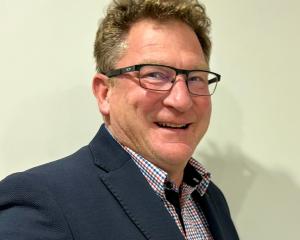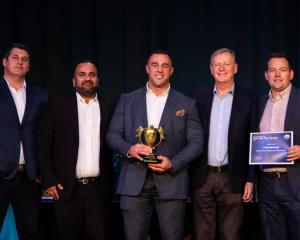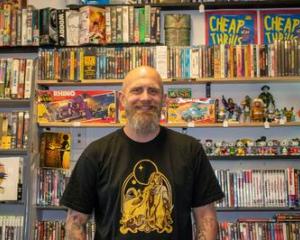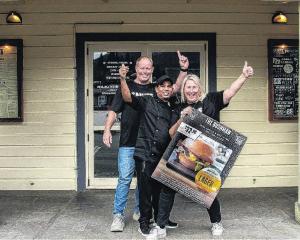
"It's pretty difficult going through one of the most difficult moments of your life so publicly."
But that is just what Melissa Vining did as she supported her late husband through his very public battle with cancer and quest for improved cancer care.
Blair Vining died in October 2019, aged 39; almost a year earlier, the Southland husband and father had been diagnosed with terminal stage four bowel cancer and told he had just eight weeks to live.
After learning there would be a six- to eight-week wait to begin treatment at Southland Hospital, the family made the decision to treat him privately.
Faced with knowing he would leave his wife and two daughters behind, he made a bucket list aimed at reducing the number of patients whose families would have to go through the same experience.
More than 140,700 people signed his petition calling for better cancer care in New Zealand, and for the creation of a national cancer agency. He also mooted the idea of building a charity hospital for the South.
Nearly three years after his death, Mrs Vining believed her husband would be "so proud" of what the community had achieved with the Southland Charity Hospital — a project she has driven — and also proud she had carried on with her own career.
Based in Findex’s Invercargill office, Mrs Vining has been with the company for nearly a decade; she heads the human resources and health and safety division, managing a team of 10.
It was a diverse and "pretty full-on" job with a wide range of clients from farming and construction to aged care and tourism, and it could range from investigating workplace fatalities to creating health and safety systems, she said.
"The office window can be pretty different every day."
It was very interesting work, particularly with some of the cases happening in the health and safety space at the moment, and she felt very fortunate to get to work on leading cases, alongside lawyers from throughout the country.
Still living in Winton, Mrs Vining also felt fortunate to be able to be based in Southland and have a nationally significant role with so much variety.
Initially studying business management and HR, she went on to specialise in health and safety at the time new regulations came in and there was increasing demand for good quality investigations, she said.
With a passion for farming, she also wanted to understand the cause of farmers and construction workers dying at work.
She felt privileged to have been able to study from a provider in the United Kingdom, and undertake United States-based workplace investigation training.
With her and Mr Vining having farmed, she was very aware of the challenges that farmers, in particular, faced, and that background led to a pragmatic and practical approach to making health and safety work for businesses, and helping to keep people safe.
Asked how she managed to juggle everything, Mrs Vining said she sometimes felt like she was holding on by her fingernails.
Just getting out of bed, in the days after Mr Vining’s death, was a challenge, and she admitted she could have easily hunkered down.
But she had promised him she would build the hospital and continue to advocate for better cancer care for all New Zealanders, particularly those in the South.
"Seeing him when he was so sick, just taking it in his stride, not giving up, is pretty inspiring," she said.
She vividly remembered the number of times her husband had back-to-back media interviews and was vomiting in a rubbish bin. He never complained and she believed that people could relate to him, because he was "just himself".
"He just wanted to make sure people had that care they deserved. It truly did shock us that wasn’t the case for many Southerners. He made the most of the time he had left to try and help others," she said.
And, during that time, Mrs Vining quipped that she became an "amazing EA [executive assistant]" to her dying husband.
Her employer had been "incredible" to her. She worked part-time for 11 and a-half months while he was sick, and while he was sleeping during treatment she could spend several hours working in Findex’s Dunedin office.
When Mr Vining first mentioned the charity hospital, his wife thought he was joking.
"I was like, ‘you could give me a holiday, not a project’."
But it was a privilege to be involved with it; one of the greatest joys was seeing school children fundraising for it, amid the plethora of acts of kindness.
There had been overwhelming community support; from tradespeople to farmers, medical staff to transport companies — "all these people just do what they can to contribute to the project". Just recently, 20 workers gave up their time to build an entire switchboard for the building.
An "incredible" amount of progress had been made on the conversion of a former pub to a hospital in the past three months and the community room and kitchen had been installed. It was on track to be finished by Christmas for an opening in January.
While Mrs Vining’s day job was demanding, she was grateful for the support of Findex and the ability for flexibility if she needed to attend to hospital matters. The support from the company’s various offices had also been "overwhelming".
First and foremost, Mrs Vining said she was a mother and she felt very lucky to have such a supportive family that helped her, along with friends and the school community — otherwise, she "wouldn’t be able to do any of the things I do".
Asked how she was coping in the aftermath of her husband’s death, Mrs Vining said grief was "one of the most cruellest experiences".
"For your children to lose a parent at that age, there’s just no words to describe it."
And that deep sense of sadness was something that did not go away; it could hit her at work when she was doing a project, or when she had some news that she wanted to call and share with Mr Vining and he was not there.
Mrs Vining continued to do a lot of work with cancer patients who needed support or help and she did not see that going away any time soon — "until the health system gets sorted out".
Information she was receiving from nurses, in particular, was the situation was at a critical point, not only for patients but also for health workers, in what was an overstretched system.
It was "unreasonable" that patients were potentially going to be harmed because of that, and nobody was taking immediate action to make the situation better, she said.
It was not just normal work pressure — "I remember what it’s like, it’s horrendous" — and she found it "bizarre" that WorkSafe had not stepped in.
Having spent more than 11 months travelling each week from Winton to Dunedin, she was "so grateful" the charity hospital would meet a need for the southern community, a community which she "couldn’t be more proud of".
"Southerners are incredible people. They’ve just gone above and beyond to support the project," she said.
In her day job, when she was working on a case or for a national client, it was often commented about her living in Invercargill.
She proudly pointed out that she actually lived in Winton — "a very special community" — and she felt very fortunate to live in such a great part of the country, while being able to have a challenging and exciting career.
As far as her recent promotion to associate partner, it was nice to be part of the senior leadership team of such a good company, she said.













